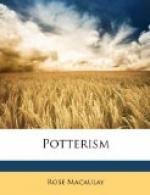But I don’t want to discuss Bolshevism here. Boris Stefan hadn’t really anything to do with it. He wasn’t a politician. He was a dreamy, simple, untidy, rather childlike person, with a wonderful gift for painting. Rosalind and I had got to know him at the Club. They were both beautiful, and it hadn’t taken them long to fall in love. One Russian-Jewish exile marrying another—that was the bitterness of it to our very Gentile mother and our Sidneyfied father, who had spent fifty years living down his origin.
So I was called in to assist in averting the catastrophe. I wouldn’t say anything except that it seemed very suitable, and that annoyed my mother. I remember that she and I and Rosalind argued round and round it for an hour one hot evening in the drawing-room at Queen’s Gate. Finally my mother said, ’Oh, very well. If Rosalind wants a lot of fat Yid babies with hooked noses and oily hair, all lending money on usury instead of getting into debt like Christians, let her have them. I wash my hands of the lot of you. I don’t know what I’ve done to deserve two Sheenies for children.’
That made Rosalind giggle, and eased the acrimony of the discussion. My mother was a little fair woman, sharp-tongued and quick-tempered, but with a sense of fun.
My father had no sense of fun. I think it had been crushed out of him in his cradle. He was a silent man (though he could, like all Jews, be eloquent), with a thin face and melancholy dark eyes. I am supposed to look like him, I believe. He, too, spoke to me that evening about Rosalind’s engagement. I remember how he walked up and down the dining-room, with his hands behind him and his head bent forward, and his quick, nervous, jerky movements.




